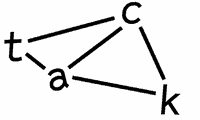Concepts of authorship in architecture | An examination of the unspoken mechanisms of designing and making buildings
Lecture by Christoph Grafe, Bergische Universität Wuppertal and Peg Rawes, Bartlett, UC London. The lecture is organised as a TACK talk, as a discussion between the partners, and streamed via YouTube on the TACK website. https://youtu.be/Ackv8wXcx7I
The annual lecture series at IKA in the academic year 2021/2022 will be organised in partnership with the EU research project Communities of Tacit Knowledge (TACK): Architecture and its Ways of Knowing , in which we are involved as one of ten academic partners.
March 2022
Concepts of authorship in architecture | An examination of the unspoken mechanisms of designing and making buildings
Christoph Grafe, Bergische Universität Wuppertal
The concept of authorship, and its association with a single (European, male, heterosexual) individual, is ingrained in the complex of tacit assumptions about what constitutes a work of art and its production. Perhaps somewhat ironically it is applied also to architectural works of art, which are, by definition, the product of collective endeavours. The specific nature of the processes of designing buildings and getting them realised – the realities of an essentially situated form of cultural practice - may even be an explanation for the persistent emphasis on the individual in whose heroic vision the original idea for the work resides. The need to establish and exert authorial authority in a highly volatile field of power relationships between financiers, officials, builders and users requires a set of tacit strategies of persuasion, of forging a temporary collective and of coercing others to follow in acts of self-exploitation. The question is, however, if in our current circumstances the concept of individual authorship is not a cul-de-sac, preventing the processes of invention and innovative thinking that would be necessary for addressing a practice that is more collaborative than it has been in the past and which operates in a culture that professes to question rather than valuing authority. Is there not also a need to conceptualise, regain and possibly invent alternative notions of authorship which may be more diffuse, but still no less effective in producing works of art (aka significant cultural statements) in architecture? What would this mean for the modus operandi of those who engage with these creative and social processes, and how might the deep intellectual and emotional ownership that is a precondition for conceiving and making architecture be retained, framed and even intensified in new organisations of labour for this old discipline, and for establishing innovative communities of practice?
Christoph Grafe trained as an architect and subsequently worked in practice, as a young employed collaborator on a variety of commercial, residential and cultural building projects. Meanwhile he sought to retain a sense of distance to these experiences by collaborating as an editor of OASE journal of architecture and eventually (perhaps) found a refuge of sorts in academia, where he taught both architectural design and theory. He was appointed professor of architectural history and theory, at the University of Wuppertal, but also served as director of the Flanders Architecture Institute in Antwerp (2017-2019) and Interim City Architect in Antwerp (2015). Publications include People's Palaces - Architecture, Culture and Democracy in post-war Western Europe and Umbaukultur – An architecture of altering (with Tim Rieniets). He remains a devoted and curious member of the editorial board of OASE and editor/publisher (with Franziska Bollerey) of Eselsohren .
Peg Rawes, Bartlett, UC London
Communities of Tacit Knowledge share value systems. The norms and standards within the practice of architecture are, however, also informed by the culture within which they emerge and operate. Unravelling the intricate relations between contextual (culture-based) value systems and the disciplinary values of architecture is central to the IRP 'Values'.
Peg Rawes will discuss tacit knowledge in architectural authorship with respect to current political, ethical and environmental values.
Dr. Peg Rawes is Professor of Architecture and Philosophy, and Director of the MA Architectural History, at the Bartlett School of Architecture, UCL. She is author of Space Geometry and Aesthetics: Through Kant and Towards Deleuze (2008) and Irigaray for Architects (2007), and the anthologies, Architectural Relational Ecologies: Architecture, Nature and Subjectivity (ed., 2013) and Poetic Biopolitics: Practices of Relation in Architecture and the Arts (co-ed., 2016), which publish architects alongside artistic, environmental, human rights, social and medical research. Her recent publications include: 'Reputations: Donna Haraway', The Architectural Review (Feb 2022), ‘Conversation with Design Earth’, Reimagining Museums for Climate Action (2021); 'Visualising uncertainty and vulnerability', Materia Arquitectura Journal (2021), 'Nonhuman architectural ecologies', Is there an Object Oriented Architecture? (2020), 'Aesthetic Geometries of Life', Textual Practice (2019), 'Insecure Predictions', E-Flux Architecture (July 2018) and 'Housing biopolitics and care', Critical and Clinical Cartographies (2017).


